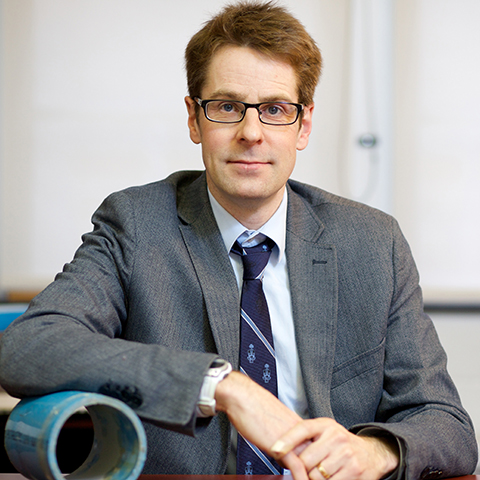Biography
Research
Publications
Awards & Grants
Open Positions
My research projects help to address the following UN Sustainable Development Goals:
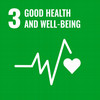
Learn more
Dr. Filion is a professor in the Department of Civil Engineering at Queen's University. He is also an Associate Editor with the ASCE Journal of Water Resources Planning & Management, and a licensed professional engineer (P.Eng) with 15 years' research and consulting experience in municipal and environmental engineering. In that time, Dr. Filion has been developing decision support tools and technologies to support the water and municipal engineering community in making cost-effective decisions to design and rehabilitate water distribution systems. His expertise in water distribution systems analysis and optimization and his expertise in hydraulics has been sought by PEO, scientific advisory committees for international conferences in water distribution network modelling, and the Natural Science and Engineering Research Council (NSERC) to review scientific proposal.
Dr. Filion has also had the opportunity to work in the consulting industry. Before undertaking a PhD, he spent some time in the employ of the consulting firm R.V. Anderson Associates Limited in Toronto, Ontario, Canada. His consulting experience is wide-ranging and includes the design of drinking water, storm water, and wastewater systems, as well as infrastructure-renewal planning. Dr. Filion is currently a licensed Professional Engineer (P.Eng) in the province of Ontario.
As a leading researcher in sustainable water systems, Dr. Filion is developing innovative solutions to the high energy costs and water quality problems associated with aging municipal water systems. As water systems age, they require more energy to operate. Dr. Filion is exploring ways to reduce the energy and environmental footprint of water systems. His research is intended to help municipalities deliver safe drinking water to Canadians more cost effectively and with less energy; to achieve this, he has been developing whole-of-life design approaches to optimize the rehabilitation of water main assets that will reduce energy use and the greenhouse gas emissions linked to water provision. Dr. Filion is also developing a novel energy analysis to help municipalities better understand how reducing leakage, conserving water, and rehabilitating old pipes can save energy in water systems. Dr. Filion has recently been recognized by his peers for his leading contributions to the field of sustainable water systems with a keynote lecture at the 2014 International Water Distribution System Analysis Conference. Additionally, Dr. Filion’s pioneering work in life-cycle energy analysis of water systems has also been recognized with “best paper” awards from the Journal of American Water Works Association.
Dr. Filion is also working to improve drinking water quality in water distribution systems. His research focus is threefold: (1) advancing the understanding of mechanisms behind the accumulation and release of metals (e.g., manganese and iron among others) that cause water quality problems when mobilized from the pipe wall; (2) understanding how environmental, water quality, and fluid flow conditions influence the properties of multi-species biofilms (microbial composition, physical structure, mechanical strength) in drinking water distribution systems; and (3) examining the role that heavy metals and antibiotic compounds play on the development of bacterial resistance in drinking water biofilms.
Education
- Doctor of Philosophy (PhD) - Civil Engineering, University of Toronto, Canada, 2006
- Master of Applied Science (MASc) - Civil Engineering, University of Toronto, Canada, 2001
- Bachelor of Applied Science (BASc) - Civil Engineering, University of Toronto, Canada, 1997
Selected Appointments
-
Associate Editor, ASCE Journal of Water Resource Planning and Management (2011-present).
-
Group Chair (Elected), Water Distribution Systems Analysis Standing Committee, Environmental and Water Resources Institute Officer, Executive Committee (2019-2022).
-
Track Chair, Water Distribution Systems Analysis, 2021 World Environmental and Water Resources Congress (2020-2021).
-
Conference Co-Chair 1st International WDSA/CCWI Joint Conference 2018, Kingston, ON, Canada (2018).
-
Chair, International Scientific Advisory Committee, 1st International WDSA/CCWI Joint Conference 2018, Kingston, ON, Canada (2018).
-
Chair, Local Organizing Committee, 1st International WDSA/CCWI Joint Conference 2018, Kingston, ON, Canada (2018).
-
International Scientific Advisory Committee Member, CCWI (2009, 2011, 2013, 2015, 2017, 2019).
-
International Scientific Advisory Committee Member, WDSA (2008, 2010, 2014, 2016).
-
International Scientific Advisory Committee Member, Joint WDSA/CCWI (2018, 2021).
Metals Accumulation and Release in Drinking Water Distribution Systems
Have you ever opened your faucet and seen reddish/brown-coloured water flow out of your tap? Have you ever wondered why the water flowing from your tap is some times of such poor quality? Dr. Filion and his research group are examining the physico-chemical, microbiological, and hydrodynamic mechanisms that account for the adhesion and eventual mobilization of inorganics such as iron and manganese on the wall of municipal drinking water pipes that cause water quality problems like “red water” described above. To do this, Dr. Filion and his research group are using the full-scale Drinking Water Distribution Lab (DWDL) (see Figure 1) which is a unique research facility in North America that can replicate the full hydraulic, physico-chemical, and microbiological conditions of real distribution systems in a fully-controlled environment. A driving research interest in the group is the question of how microbial communities in drinking water biofilms can mediate the transfer of dissolved and particulate inorganics from the aqueous phase in the bulk water to the pipe wall. Techniques such as qPCR, 16s rRNA gene marker sequencing, brightfield microscopy (see Figure 2) and fluorescence microscopy and ATP monitoring are being used to characterize the microbial community composition and spatial distribution of metals, biofilm cells, and biofilm extra-cellular polymeric substance on the internal surface of pipe walls.
Active Research Topics:
- Metals accumulation and release in drinking water distribution systems
- Influence of environmental and fluid flow conditions on biofilm properties (mechanical strength, microbial composition, extra-cellular polymeric and cellular components)
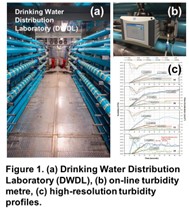
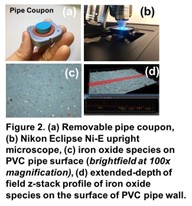
Antimicrobial and Metals Resistance in Biofilms of Drinking Water Distribution Systems
Antimicrobial resistance is jeopardizing the effectiveness of antibiotic medication in treating infections contracted during health care interventions and therapies (surgery, cancer treatment). Antibiotic resistance has been identified as one of the major global challenges of the 21st century. Sub-therapeutic concentrations of antibiotics in hospital, wastewater, and agricultural effluents have been found to promote the development of antibiotic resistance in microorganisms commonly found in drinking water supplies. In 2015, 30.7 million Canadians were served by centralized municipal drinking water systems which comprise a major environment-to-human ingestion pathway. To date, there is little research on the mechanisms for the development of antibiotic and metals resistance in drinking water systems—a key pathway for the spread of resistance in the environment.
Dr. Filion’s research group is examining the role that heavy metals and antibiotic compounds play on the development of bacterial resistance in drinking water biofilms. Molecular methods such as qPCR and 16s rRNA sequencing are being used to examine how these stressors are causing changes in gene expression in microbial communities and increasing resistance to common-use antibiotics (see Figure 3). The new knowledge on the mechanisms of antibiotic resistance will be foundational to setting operational and treatment policies by municipal partners regulators to limit public exposure to resistant bacteria in drinking water systems.
Active Research Topics:
- Characterization of dominant class/genera/species of bacteria, archaea, and fungi in multi-species drinking water biofilms exposed to antibiotics and metals
- Impact of antibiotics and metals on changes to microbial community composition and changes to resistance gene expression in multi-species drinking water biofilms
- Characterization of antibiotic/metals co-resistance and cross-resistance mechanisms in multi-species drinking water biofilms
- Characterization of the role and effectiveness of disinfection technologies on the control of antibiotic resistant organisms and genes in multi-species drinking water biofilms.
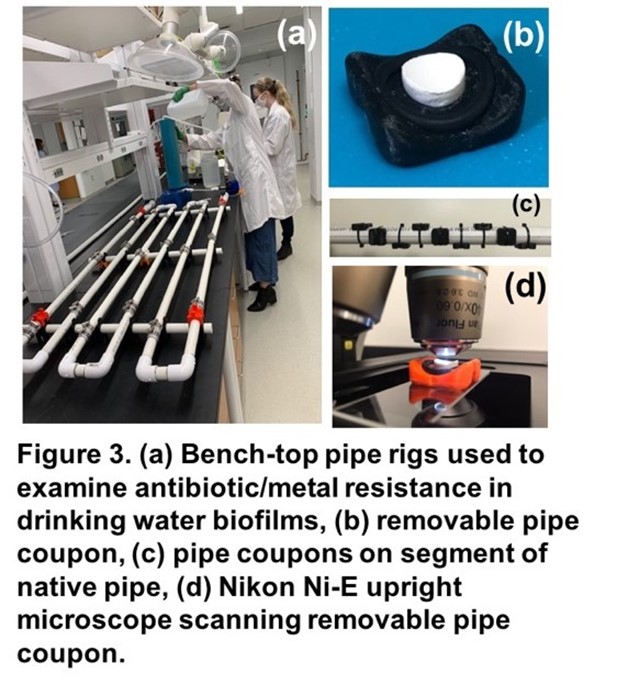
You can find Dr. Filion’s publications at his Google Scholar Page!
Selected Awards and Honours
- Way Memorial Trust Award, Queen's University (2019)
- Best Poster Award, 2019 Computing and Control in the Water Industry International Conference, Exeter, UK, September 1-4, 2019.
- '2018 AWWA Water Resource Sustainability Division Paper Award', Journal of American Water Works Association (2018).
- Invited Keynote Lecture: Filion Y (2014) "There is Energy in that Drinking Water!": How the Shape and Management of Water Distribution Systems Affect Energy and Environmental Impact. 2014 International Conference on Water Distribution Systems Analysis, Bari Italy, July 14-17, 2014.
- '2014 Publications Award', Journal of American Water Works Association (2014)
- '2014 AWWA Engineering & Construction Division Best Paper Award', Journal of American Water Works Association (2014)
- 'Best Associate Editor' Award, J. of Water Resrc. Planning & Management, ASCE (2014)
- 'Best Policy Paper' nomination, ASCE J. of Water Resrc. Planning & Management (2014)
- Early Research Award - Ministry of Economic Development and Innovation (2012)
- 'Best Paper' nomination at Water Distribution Systems Analysis Symposium (2010)
- 'Best Reviewer' - ASCE J. of Water Resrc. Planning & Management (2010, 2012, 2016)
- Theme Leader - Sustainable Water Systems - NSERC CREATE (2010-2015)
- Civil Engineering Teaching Award, Dept. Civil Engineering, Queen's (2008)
Dr. Filion is currently seeking talented graduate students and post-doctoral candidates with a strong background in aquatic chemistry, microbiology, and drinking water quality to work in the areas of water quality in distribution systems, drinking water discolouration, and antimicrobial and metals resistance in drinking water biofilms.
